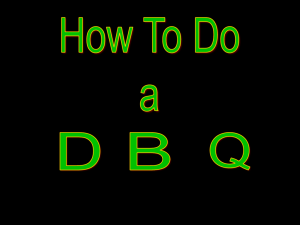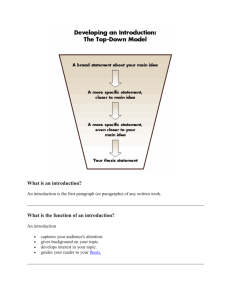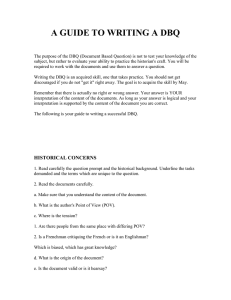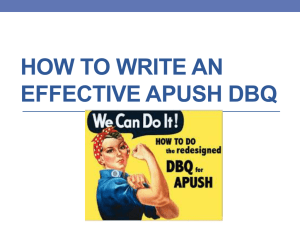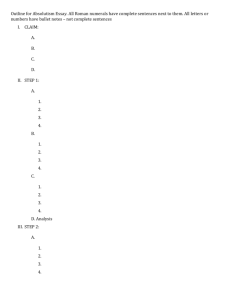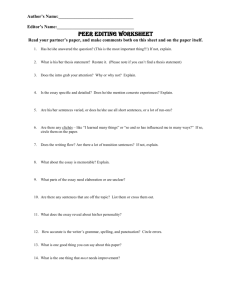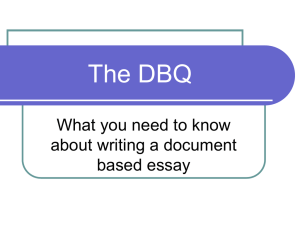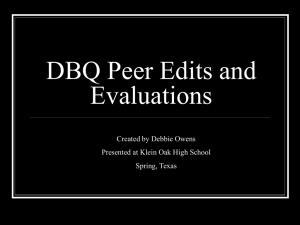AP World History DBQ - Harrison Humanities
advertisement
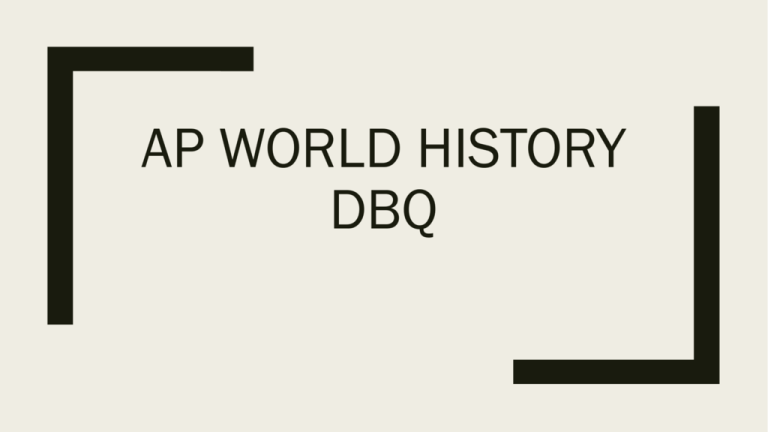
AP WORLD HISTORY DBQ Prompt ■ Re-read the prompt. ■ Highlight Key Terms – Connections – Regional Issues – European struggles for global power – Mid-eighteenth century – Additional document Map Review ■ What does the map tell you? ■ What connections can you make among the regions pictured? Document Review ■ Re-read each document ■ Determine the Point of View for each document – Why was THIS person producing THIS piece of information at THIS time or in THIS manner? Where is the author coming from? – SOAPSTONE (Speaker, Occasion, Audience, Purpose, Subject, Tone) Document Grouping ■ How does thinking about POV change your ideas about grouping? ■ Make those changes now. ■ Share with your table mates the groups you chose and why. ■ What did you learn from your peers? Adjust your groups according to your new knowledge. Adding a Document ■ What document/point of view is missing? ■ Consider what information is not being given to you that would help answer the question (within reason). ■ Remember, you do not need to ask for a specific document, rather you can ask for a kind of document or a document from a certain source. ■ Think about: Gender, Class, Ethnicity, Occupation, Region. ■ Create this statement: It would be useful to have another document by _____ / ____.document /etc. because ______. ■ Place your request in the intro paragraph. Thesis Writing ■ Fully address the question asked –Make sure that you actually answer the question and all parts of the question fully. (AP=Address the Prompt) ■ Take a position with regard to the question asked – do not straddle the fence or respond vaguely without taking a stance. At the same time do not give unasked for opinions or go too far a field in your response. ■ Provide organizational categories that will be used in the essay – that is present a roadmap of sorts for the rest of your essay. Topic Sentences ■ Topic sentences should showcase your document groups. They will be your organizational tool for the body paragraphs. ■ Topic sentences should match the thesis. ■ Adjust your topic sentences now. ■ Share with your tablemates. ■ What did you learn from your peers? Adjust your groups according to your new knowledge. Remember… ■ The purpose of the DBQ (Document Based Question) is not to test your knowledge of the subject, but rather to evaluate your ability to practice the historian's craft. You will be required to work with the documents and use them to answer a question. ■ Writing the DBQ is an acquired skill, one that takes practice. You should not get discouraged if you do not "get it" right away. The goal is to acquire the skill by May. ■ Remember that there is actually no right or wrong answer. Your answer is YOUR interpretation of the content of the documents. As long as your answer is logical and your interpretation is supported by the content of the document you are correct. Begin Your Essay… ■ Use ALL of the documents in fashioning your response, but do not simply cite the documents in "laundry list" fashion. You should strive to IMPOSE order on the documents. Find at least 3 groupings for the documents. ■ Your essay should be an ANALYSIS of the documents and their content. You are demonstrating analysis if you are doing the following: – The essay contains a thesis which answers the question and provides a roadmap (groupings). – The documents are used as evidence to support your thesis. – Frequent reference is made to the terms of the question – Be certain that your answer is always focused directly on the question. Do not drift afield. ■ Be certain that you analyze the point of view (POV) for all documents. ■ Be sure to identify at least 3 appropriate additional documents to use and explain why they would be helpful. Rough Draft ■ Write your rough draft at home. ■ Use the scoring rubric to “grade” your essay. – Highlight each point of the scoring rubric within your essay. – For instance, highlight your thesis, each use of a document, etc. ■ Forgot something from the rubric? Add it! ■ Bring your complete, highlighted rough draft to class on Monday.


